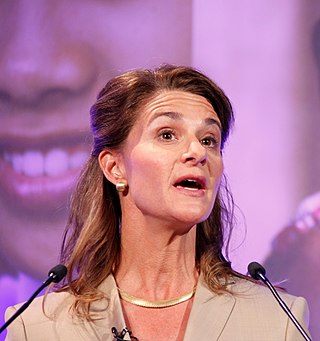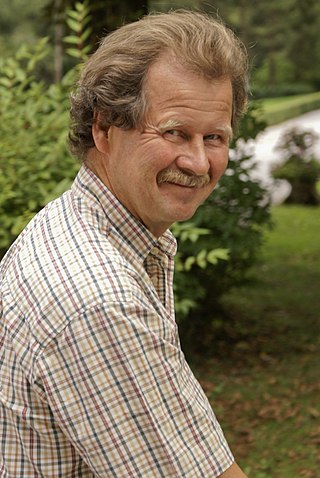
Otto Hahn was a German chemist who was a pioneer in the fields of radioactivity and radiochemistry. He is referred to as the father of nuclear chemistry and father of nuclear fission. Hahn and Lise Meitner discovered radioactive isotopes of radium, thorium, protactinium and uranium. He also discovered the phenomena of atomic recoil and nuclear isomerism, and pioneered rubidium–strontium dating. In 1938, Hahn, Lise Meitner and Fritz Strassmann discovered nuclear fission, for which Hahn received the 1944 Nobel Prize for Chemistry. Nuclear fission was the basis for nuclear reactors and nuclear weapons.

Melinda French Gates is an American philanthropist, former multimedia product developer and manager at Microsoft, and the ex-wife of its co-founder and billionaire Bill Gates. French Gates has consistently been ranked as one of the world's most powerful women by Forbes magazine.

Alessandro "Sandro" Pertini was an Italian socialist politician who served as the president of Italy from 1978 to 1985.

Tadatoshi Akiba is a Japanese mathematician and politician and served as the mayor of the city of Hiroshima, Japan from 1999 to 2011.

The names Uranverein or Uranprojekt came to be applied in Nazi Germany to the undertakings of research in nuclear technology, including nuclear weapons and nuclear reactors, before and during World War II. The first effort started in April 1939, just months after the discovery of nuclear fission in Berlin in December 1938, but ended only few months later, shortly ahead of the September 1939 German invasion of Poland, for which many notable German physicists were drafted into the Wehrmacht. A second effort under the administrative purview of the Wehrmacht's Heereswaffenamt began on September 1, 1939, the day of the invasion of Poland. The program eventually expanded into three main efforts: Uranmaschine, production of uranium and heavy water, and uranium isotope separation. Eventually, the German military assessed that nuclear fission would not contribute significantly to the war, and in January 1942 the Heereswaffenamt turned the program over to the Reich Research Council while still continuing to fund the activity.

Friedrich Wilhelm Strassmann was a German chemist who, with Otto Hahn in December 1938, identified the element barium as a product of the bombardment of uranium with neutrons. Their observation was the key piece of evidence necessary to identify the previously unknown phenomenon of nuclear fission, as was subsequently recognized and published by Lise Meitner and Otto Frisch. In their second publication on nuclear fission in February of 1939, Strassmann and Hahn predicted the existence and liberation of additional neutrons during the fission process, opening up the possibility of a nuclear chain reaction.

The Vienna International Centre (VIC) is the campus and building complex hosting the United Nations Office at Vienna. It is colloquially also known as UNO City.

Rita Süssmuth is a German politician of the Christian Democratic Union (CDU). She served as the 10th President of the Bundestag.

Manfred Nowak is an Austrian human rights lawyer, who served as the United Nations Special Rapporteur on Torture from 2004 to 2010. He is Secretary General of the European Inter-University Center for Human Rights and Democratisation (EIUC) in Venice, Italy; Professor of International Human Rights and Scientific Director of the Vienna Master of Arts in Human Rights and the Ludwig Boltzmann Institute of Human Rights and a former judge at the Human Rights Chamber for Bosnia and Herzegovina. In 2016, he was appointed Independent Expert leading the United Nations Global Study on Children Deprived of Liberty.

The Otto Hahn Medal is awarded by the Max Planck Society to young scientists and researchers in both the natural and social sciences. The award takes its name from the German chemist and Nobel Prize laureate Otto Hahn, who served as the first president of the Max Planck Society from 1948 to 1960.

Angela Kane is a German diplomat and was formerly the UN High Representative for Disarmament Affairs and Under-Secretary-General for Management in the United Nations.

Alexandra Hildebrandt is a German human rights activist and museum director of the Checkpoint Charlie Museum. In 1995, she married the museum's co-founder and former director Rainer Hildebrandt, and they remained married until his death in 2004. She is internationally noted for leading the construction of the Freedom Memorial, which was controversially demolished in 2005. The focus of Alexandra Hildebrandt's work is the preservation and advancement of the Checkpoint Charlie Museum, the rehabilitation of the victims of the GDR-Regime, and the clarification of more destinies of refugees who suffered death at the East–west border. In 2004, she endowed the international human rights award, the Dr. Rainer Hildebrandt Medal, which is given annually in recognition of extraordinary, non-violent commitment to human rights.

The Medal for Exemplary Border Service was a national award issued in the German Democratic Republic (GDR). It was established on 28 May 1954, by the Council of Ministers of the GDR with Order No. 47/54 from the Ministry of Interior on 16 June 1954. The first presentation ceremony took place on 1 July 1954, to members of the German Border Police.
Helmut Schwarz is a German organic chemist. He has been a professor of chemistry at the Technische Universität Berlin since 1978. In 2018, he was elected a foreign associate of the U.S. National Academy of Sciences.

Güenther Wilhelm van Well was a German diplomat, Secretary of State from 1977 to 1981, and West German Ambassador to the United States from 1984 to 1987.
The Internationale Liga für Menschenrechte (Berlin) (ILMR) has awarded the Carl von Ossietzky Medal since 1962. The league has honored personalities, initiatives or organizations who have worked with civil courage and outstanding commitment to the realization of human rights annually since 1962 and at least once every two years from 2011 with the Carl von Ossietzky Medal it donated. The award is named after the German pacifist and Nobel Peace Prize laureate Carl von Ossietzky, who died in 1938 as a result of imprisonment in a concentration camp.
Sven Simon is a German law professor and politician who has been serving as a Member of the European Parliament since 2019. He previously taught international and European law at Philipps University of Marburg. In the 2019 European Parliament election he was the lead candidate for the Christian Democratic Union Hessen.

The post of Special Rapporteur on Minorities has been created as minorities in all regions of the world are exposed to serious threats, discrimination and racism and are often excluded from participation in economic, political and social life. It shall provide for the implementation of the Declaration on the Rights of Members of National or Ethnic, Religious and Linguistic Minorities, taking into account existing international norms and national minority laws.
The Working Group Against Enforced and Involuntary Disappearance has been set up to investigate cases in which persons are detained or killed by states in secret prisons and the corpses are disposed of so that nothing can be proven to them.
Rüdiger König, is a German diplomat who is currently the Permanent Representative of Germany to NATO since 2020.






















